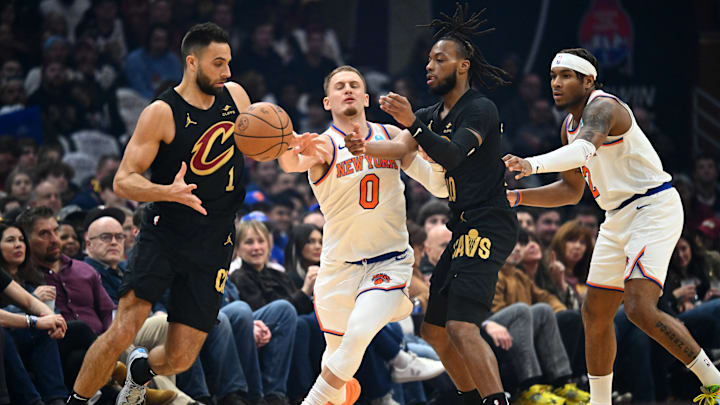While the Cleveland Cavaliers battle the Milwaukee Bucks and New York Knicks for playoff positioning, the Cavaliers have yet to overcome a fatal flaw that cost them last postseason.
Last season, superstar Donovan Mitchell led the Cavaliers to the franchise's first 50-win season since the 2017-18 regular season. Following a tremendous campaign, the Cavs fell apart near instantly in the playoffs against the New York Knicks. Their lacking playoff experience, dreadful three-point shooting and shallow bench depth contributed to the loss.
The Cavaliers have made their intentions to reach the highest tier of contenders clear, but their quick postseason loss highlighted their drawbacks. Changes and upgrades needed to be made, and the Cavs wasted no time in making them. In the offseason, Cleveland addressed these three failures with the addition of Max Strus and Georges Niang alongside interior development from their blossoming young core.
Amid countless injuries, the Cavs have built another impressive season with a noticeably greater perimeter presence and willing mentality from every member of the squad. Still, Cleveland repeatedly allows themselves to be easily beaten in one critical statistic. Throughout this year, the Cavaliers have allowed an average of 10.2 offensive rebounds for their opponent. While the Cavs have made significant strides in their toughness, their stifling defense is too often in vain when they are battered with continued extra chances.
Every Cavalier needs to fight for rebounds to win
Evan Mobley and Jarrett Allen are both averaging career highs in total rebounds with both big men grabbing double-doubles on a near nightly basis. Each player also ranks among the best of the NBA in defensive impact. The intensity and consistent domination Cleveland's duo brings in the post often forces opponents to prioritize long-range shooting rather than racing the paint.
While this makes rivals take lower-percentage shots, missed shots are more likely to turn into long rebounds. The opposing offense knows the three-pointer is going up by design and is prepared to chase the long board. Conversely, the Cavs rarely chase down the missed shot, allowing lesser teams to force the Cavaliers into closer and more exhausting games than what should be needed.
Against the falling Joel Embiid-less Philadelphia 76ers, the Cavaliers allowed 16 total offensive rebounds and 24 second-chance points. The Cavaliers still pulled out a 117-114 home victory but allowed the Sixers to hold onto hope for far too long in Mitchell's return. With only eight games until the playoffs, the Cavaliers cannot afford to exert all of their energy in regular season matchups against worse squads.
Cleveland's intensity inconsistently appears, best showcased by splitting a short two-game series against the Charlotte Hornets 1-1. After blowing out the Hornets 115-92 at home, the Cavs vanished in a 111-118 loss. While the Cavs adamantly acknowledged their lacking energy in the frustrating loss, time is running low and excuses are diminishing to correct course for the postseason.
If Cleveland expects to make it past the first round this year, everyone on the court needs to chase missed shots and bring energy and grit every night. In all four losses to the Knicks last postseason, the Cavs sorely lost the rebounding battle. When teams get physical with the Cavaliers on the boards and chase long misses, Cleveland does not respond accordingly.
Cleveland's rebounding woes have not cost them every time, but it has led to numerous games that become a more difficult and closely-contested match than it needs to be. Donovan Mitchell, Isaac Okoro and Max Strus have shown the attitude and capability to shift the rebounding battle in the Cavs' favor. In the final stretch, these three need to set the tone and hold their teammates accountable on the boards. While some misses will inevitably not go Cleveland's way, a trio of Cavaliers who are willing to make the extra play could sway close games in the postseason.
Consistency is a do-or-die element to the playoffs. As the regular season winds down, the Cleveland Cavaliers must adjust their response to rival three-point shots, tracking down misses and converting them into easy transition points on the other end.
